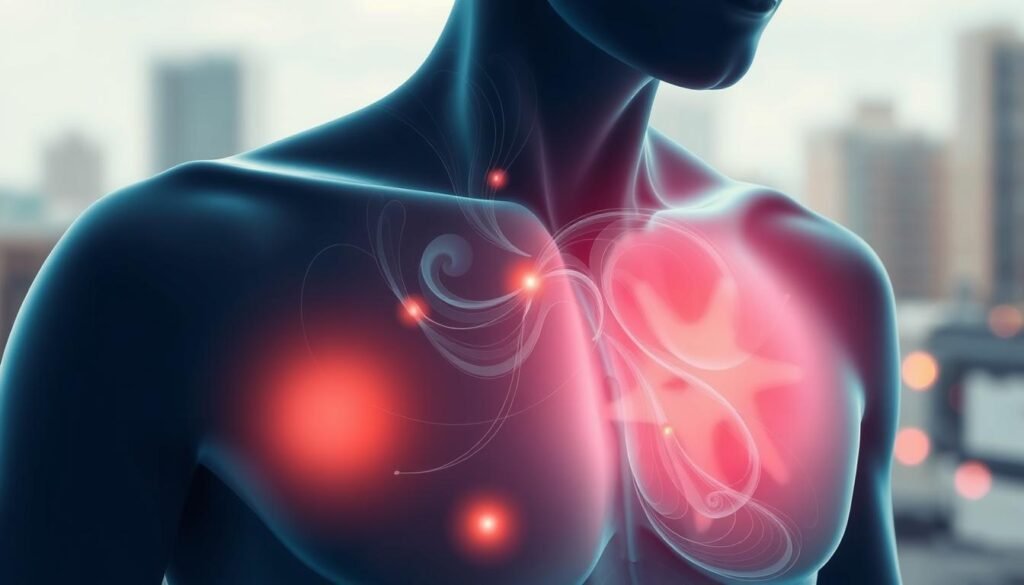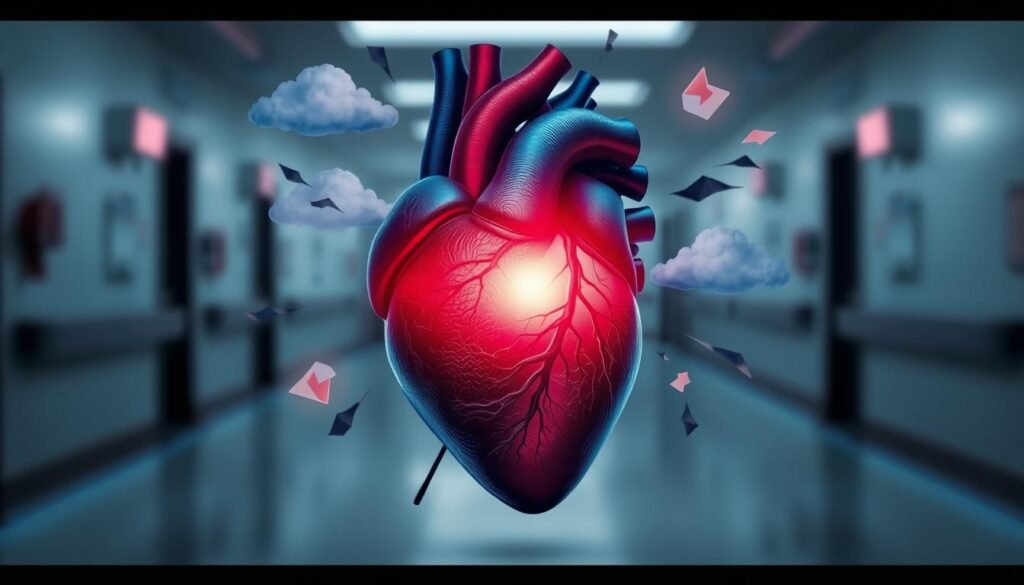Every year, over 7 million people go to emergency rooms in the United States for chest pain. But, not all cases are severe, like a heart attack might be. Knowing how chest discomfort and anxiety symptoms differ is key. It’s crucial for getting help quickly. While some chest pains are due to big health problems, anxiety can look very similar. Knowing when to get help for chest pain and anxiety can save lives.
Understanding when to take symptoms seriously can improve how we manage our health. This article will highlight key signs. These signs help tell apart chest pain from anxiety and pain that needs urgent care. Knowing these differences means facing the situation with calm and focus. It helps keep our health as the main concern.
Key Takeaways
- Chest pain can indicate a serious health condition or be associated with anxiety disorders.
- It is essential to recognize distinctive signs that require emergency care.
- Not all instances of chest discomfort relate to heart attacks; many involve other causes.
- Understanding personal symptoms and medical history can aid healthcare professionals in diagnosis.
- Women and specific demographics may experience atypical symptoms during a heart-related event.
- Immediate medical attention is warranted for persistent or severe chest pain symptoms.
- Regular health check-ups play a crucial role in preventive care for heart health.
Understanding Chest Pain and Anxiety
Chest discomfort linked with anxiety can be confusing. It’s essential to know how they’re connected for better management. Anxiety can cause various physical signs, chest pain included. This makes it tough for people to understand their discomfort.
Definition of Chest Pain
Chest pain includes any discomfort in the chest area. It can feel sharp, dull, or tight. It’s important to know that not all chest discomfort is heart-related. Many times, anxiety is the cause. Research shows that nearly half of those who go to the ER for chest pain don’t have heart issues. Anxiety might be the cause in 30-40% of these visits. Knowing the true cause of symptoms is key.
The Relationship Between Anxiety and Chest Pain
Anxiety can trigger stress responses, leading to chest pain. When stressed, our bodies release adrenaline and cortisol. These hormones can mimic heart problem symptoms. Many people with panic attacks, about 20% to 70%, feel chest pain. This can make them think it’s a heart issue and seek emergency help.
About one-third of heart attack victims don’t feel chest pain, so proper checks are crucial. Understanding how anxiety influences symptoms helps in getting the right treatment. For more info, check this detailed article.
Common Symptoms of Chest Discomfort
Chest discomfort shows up in many ways, often confusing those who feel it. It’s important to know the types of chest pain and related signs. This knowledge helps people figure out what they’re experiencing.
Types of Chest Pain
Chest pains vary greatly. They can be sharp and stabbing or dull and constant. Here are some heart-related symptoms:
- Angina: This is a squeezing pain in the chest caused by not enough blood flow to the heart.
- Heart attack symptoms: These include severe pain spreading to shoulders, neck, arms, back, or jaw.
- Gastroesophageal reflux disease (GERD): Often feels like a burning chest pain, similar to heartburn.
- Panic attacks: They can cause serious chest pain, similar to heart problems.
- Costochondritis: This is a sharp pain that gets worse with movement or certain positions.
Associated Symptoms with Chest Pain
Knowing additional symptoms helps tell apart anxiety from heart conditions. These might be:
- Shortness of breath
- Dizziness or feeling lightheaded
- Sweating or experiencing cold sweats
- A fast heartbeat or irregular beats
- Feeling sick and very tired
Chest discomfort can come from many issues, like muscle strain or lung problems. Understanding all these symptoms is key to taking care of your health.

Recognizing Heart Attack Signs
Knowing the signs of a heart attack is crucial. It can save lives and improve health outcomes. It’s also hard to tell the difference between anxiety symptoms and heart attack signs. But knowing the critical signs can guide you on when to seek medical help.
Common Indicators of a Heart Attack
There are key symptoms that might warn of a heart attack. It’s important to watch out for these indicators:
- Chest pain lasting more than 15 minutes: This symptom separates a heart attack from anxiety, which fades faster.
- Pain radiating to other areas: Heart attack pain can spread to arms, neck, or jaw.
- Vague symptoms in women: Women’s signs can be less clear than men’s.
- Minimal symptoms in older adults: Seniors or those with diabetes might show few or no signs.
- Progressive symptoms: Some people report early warning signs hours, days, or weeks before an attack.
Differences Between Heart Attack and Anxiety Chest Pain
It’s key to know how anxiety chest pain differs from heart attack symptoms:
| Feature | Heart Attack | Anxiety Chest Pain |
|---|---|---|
| Duration | Long-lasting, over 15 minutes | Short-lived, a few minutes to an hour |
| Location of Pain | May radiate to other body parts | Typically localized |
| Trigger Factors | Physical exertion | Mental or emotional stress |
| Response to Rest | Pain persists | May improve with relaxation |
Understanding these heart attack signs is vital. Anxiety can cause similar symptoms, like chest pain and sweating. But medical care is essential for suspected heart attacks, no matter how slight the symptoms may seem.

When to Seek Medical Help for Chest Pain and Anxiety
Knowing when to seek medical help is key, especially for chest pain and anxiety. Immediate attention is needed for certain symptoms. If chest pain lasts more than a few minutes or comes with other signs, get help. Shortness of breath or a rapid heart rate are such symptoms. They require quick action to check for serious conditions.
Key Indicators Prompting Emergency Care
- Persistent chest pain that does not subside
- Symptoms lasting several minutes, especially if severe
- Accompanying symptoms like shortness of breath or rapid heartbeat
- Chest pain coupled with dizziness or confusion
- Increased anxiety episodes leading to heart palpitations
Consulting with a Healthcare Professional
For those with ongoing chest pain or anxiety, seeing a healthcare provider is crucial. About one in five people in the U.S. face anxiety disorders. These often cause physical issues that may confuse diagnosis. Getting expert input helps tell apart anxiety symptoms from serious heart problems. Important note: heart palpitations with other symptoms need urgent medical counsel. Refer to this resource for chest pain emergency room for more info. Also, see how anxiety could be causing your chest discomfort at anxiety and chest pain resources.

Anxiety Disorders and Their Effects on Cardiovascular Health
Anxiety disorders can hurt your heart health. Stress hormones go up with anxiety, making the heart rate and blood pressure rise. Over time, this can lead to serious heart problems. Knowing how anxiety affects the heart is key to taking action.
Impact of Anxiety on Heart Health
Anxiety can cause long-term heart issues. Many recovering from heart attacks face anxiety for up to a year. Patients waiting for heart surgery also feel more anxious. This anxiety can lead to heart disease and other problems.
Statistics Related to Anxiety and Chest Pain
Studies show a link between anxiety and chest pain. About 20% of people with heart failure also have anxiety. Anxiety can increase the risk of heart disease in people without heart problems. Alarmingly, it raises the risk of heart events by 74% for those with anxiety disorders. Knowing these facts is vital for managing anxiety.
Panic Attack Treatment Options
Treating panic attacks is key for those suffering from severe anxiety. Learning about different therapy and medication choices can really help in controlling symptoms. Using both methods together is often the most effective, helping people take back their lives.
Therapeutic Techniques for Managing Panic Attacks
Cognitive Behavioral Therapy (CBT) is a main technique to fight panic attacks. It teaches people to change negative thoughts that cause anxiety. By facing fears little by little through exposure therapy, one can learn better ways to cope.
Adding other methods like mindfulness helps too. It makes you more aware of the now, lowering anxiety.
Medication Options for Anxiety Relief
For medication, there are several antidepressants that ease anxiety. SSRIs and SNRIs are good for treating panic issues. But, take care with Benzodiazepines. They work fast but can lead to dependence.
Always work with healthcare professionals to find the best meds for you. To learn more about treating panic attacks, click here.
Home Remedies for Anxiety and Chest Discomfort
Many people with anxiety feel chest discomfort. It’s key to find home remedies that help. Practices like breathing exercises and making lifestyle tweaks can really make a difference. They bring a sense of peace and boost one’s health.
Breathing Exercises to Reduce Chest Pain
Breathing exercises are very effective against anxiety-induced chest pain. Techniques such as deep breathing can make your heart rate slow down and relax your nerves. Let’s look at some helpful breathing methods:
- Diaphragmatic breathing: This involves taking deep breaths into your belly, which helps air move better.
- Box breathing: You breathe in for four counts, hold for four, breathe out for four, and pause for four.
- Pursed lip breathing: This method keeps the airways open longer, aiding those with breath shortness.
Lifestyle Changes to Manage Anxiety
Small lifestyle changes can greatly reduce anxiety. These changes are good for both your mind and can lower chest pain too. Here are some to consider:
- Regular exercise: Working out releases endorphins which make you feel better and lessen anxiety.
- Balanced diet: Eating fruits, veggies, grains, and lean meats is key for overall health and managing anxiety.
- Quality sleep: Good sleep is crucial for managing mood and stress.
Adding home remedies like breathing exercises and lifestyle adjustments can help manage anxiety and chest discomfort in a natural way. It supports both your physical and mental health, giving you tools to tackle challenges.
| Home Remedy | Potential Benefits |
|---|---|
| Almonds | May alleviate heart pain and support cardiovascular health |
| Hibiscus tea | Helps with bloating and might lower blood pressure |
| Baking soda in warm water | May reduce stomach acid causing heart pain |
| Garlic with warm milk | Possibly reduces plaque buildup in arteries |
| Apple cider vinegar | Claimed to alleviate acid reflux symptoms |
Seeking Professional Help for Mental Health Support
Addressing anxiety is often more complex than self-help means. It majorly benefits from professional guidance. Therapy provides a safe space for individuals to discuss their feelings and manage anxiety triggers efficiently.
Importance of Therapy for Anxiety Management
Therapy brings great benefits to those dealing with anxiety. It helps understand damaging thought patterns and teaches how to cope with stress. A common recommendation by health experts is cognitive behavioral therapy (CBT). CBT helps shift negative thoughts towards positive and practical ones. Through therapy, individuals learn effective ways to fight anxiety, which boosts their overall health.
Ways a Therapist Can Help with Symptoms
A therapist can offer strategies tailored for anxiety symptoms management. Their treatment plans can include:
- Individual counseling sessions to address specific issues
- Support in developing effective coping mechanisms
- Medication management to alleviate severe anxiety
- Education on the physiological responses of anxiety, such as stress hormones like adrenaline and cortisol
Therapists assist in uncovering the roots of anxiety, be it work pressure, family duties, or other stress-inducing factors. This relationship underlines the significance of mental health support for successful anxiety management.
Conclusion
It’s really important to understand how anxiety and chest pain are connected. Knowing the difference between harmless symptoms and emergency situations can save lives. If you feel chest pain, remember it’s not always a heart problem. In fact, 30% to 50% of these pains come from anxiety, not heart issues.
Getting help from a doctor can relieve your anxiety and improve your health. There are many reasons for chest pain, from heart problems to stress. If you think stress causes your pain, check out this link: the necessity of accurate diagnosis. It’s really important to get the right diagnosis.
Being informed about your health is key to feeling better. By understanding what causes your symptoms, you can take steps to improve your health. Adopting healthy habits helps with anxiety and chest pain, making life better.